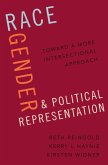Popular consensus has long been that if "enough women" are present in political institutions they will represent "women's interests." Yet many believe that differences among women--women disagreeing about what is in "their interest"--fatally undermine both the principle and the practice of women's group representation. In this book, Karen Celis and Sarah Childs redress women's poverty of political representation with a new feminist account of democratic representation. Rather than giving up on women's group representation, Celis and Childs re-think and re-design representative institutions, taking women's differences--both ideological and intersectional--as their starting point.
Feminist Democratic Representation considers a broad spectrum of contemporary problematics--abortion, prostitution/sex work, Muslim women's dress, and Marine Le Pen--to discuss women's under- and misrepresentation and the "good, bad and the ugly" representative. As problem-driven scholars firmly grounded in feminist and democratic empirical and theoretical political science, Celis and Childs imagine what good representation for women in all their diversity could look like--representation as it should be. To realize this ideal in today's established representative democracies, they present a second-generation feminist design for parliaments and legislatures, underpinned by a re-thinking of feminist and democratic principles. Celis and Childs conceive of representation as a m?lange of dimensions, and they shift the focus in women's group representation from feminist outcome to feminist process. Inclusive, responsive, and egalitarian representation for all women demands a new category of representatives in parliaments: the "affected representatives of women" who are epistemologically and experientially close to differently affected women. Affected representatives passionately advocate within political institutions, and publicly hold elected representatives to account. Feminist processes of representation have wide effects and deepen relationships between women and their democratic institutions. Against the more fashionable tide of post-representative politics,
Feminist Democratic Representation argues not simply for more, but significantly better, representation.
Dieser Download kann aus rechtlichen Gründen nur mit Rechnungsadresse in A, B, BG, CY, CZ, D, DK, EW, E, FIN, F, GR, HR, H, IRL, I, LT, L, LR, M, NL, PL, P, R, S, SLO, SK ausgeliefert werden.









